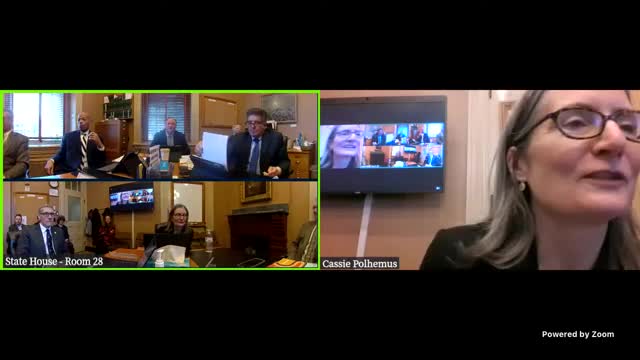Vermont Economic Development Authority outlines agricultural lending tools, seeks $1 million interest-subsidy in governor's budget
Get AI-powered insights, summaries, and transcripts
Subscribe
Summary
VEDA officials briefed the Senate Agriculture Committee on agricultural lending programs, emergency loans and SSBCI-subsidized interest products and said they are seeking a $1 million appropriation to continue interest-subsidy support for farm borrowers.
Cassie Paulimas, chief executive officer of the Vermont Economic Development Authority (VEDA), told the Senate Agriculture Committee on Jan. 17 that VEDA devotes roughly one-third of its loan portfolio to agriculture and is asking the legislature to consider a $1,000,000 appropriation to continue interest-subsidy programs for farm borrowers.
The request is intended to replace or supplement federal State Small Business Credit Initiative (SSBCI) funds that VEDA has used to subsidize interest rates on loans to farms. "Vermont Economic Development Authority is an instrumentality of the state. We're created under state statute in Title 10, Chapter 12," Paulimas said, describing VEDA's legal status and its agricultural-lending work under the Vermont Agricultural Credit Corporation entity. She said SSBCI money allowed VEDA to subsidize borrower rates and that the agency has largely deployed its SSBCI tranches.
Why it matters: Committee members and VEDA staff framed the subsidy as a tool to reduce borrowing costs for small and medium-sized farms facing volatile commodity markets and rising interest rates. Paulimas said the SSBCI subsidy is structured to be recycled as a revolving fund: money used to buy down interest is returned to VEDA and re-lent.
Details and programs: Paulimas and VEDA staff described a range of agricultural lending products that include farm ownership loans, operating loans for equipment and working capital, refinancing in limited circumstances, and energy loans for projects such as solar arrays. VEDA also runs emergency and debt-stabilization programs; examples cited included an earlier program where $1,000,000 in state appropriation leveraged $7,200,000 in loans and a more recent ARPA-funded forgivable loan round that produced 48 loans totaling $3,200,000.
Thad Richardson, VEDA chief financial officer, and Andy Wood and Sarah Isham, co-directors of agricultural lending, discussed program mechanics. Richardson described SSBCI subsidies as lowering borrower rates by effectively covering part of VEDA's cost of funds. VEDA's stated goal for SSBCI leverage is roughly 10:1, though the program's minimum leverage requirement is 1:1; the SSBCI program runs in multiple tranches and requires deployment milestones (VEDA said it had deployed sufficient funds to receive a third tranche).
Performance and underwriting: VEDA officials said their ag lending loss rates have been low. "Because of the flexibility we have to do that, our losses in the ag sector are very, very low relative to what you hear about and the risks in farming," Paulimas said; later in the meeting a committee member asked and was told VEDA's loss rate is "less than 1%." VEDA described a typical loan approval chain that scales with loan size from individual underwriters to an internal loan committee and, for the largest loans, board approval. Paulimas said the statutory maximum ag loan VEDA can make is currently about $5,000,000 and that the portfolio's average loan size is about $200,000.
Budget request and next steps: Paulimas said the $1,000,000 interest-subsidy request was included in a recommendation submitted by the secretary of administration for the governor's budget and that the governor's proposed budget will be public on Jan. 28. The committee was invited to follow up and VEDA offered to return for further briefings on program design if the appropriation remains in the governor's proposal.
Context and limits: VEDA staff emphasized that VEDA operates as a state instrumentality and therefore is not regulated like banks (FDIC/OCC) or the Farm Credit system, giving it flexibility to work with borrowers through restructurings, sales or other long timelines. VEDA also said it borrows in capital markets and from institutions such as CoBank and must manage repayment obligations to those lenders. VEDA noted cross-portfolio lending (for example, solar loans booked in its energy portfolio even when the borrower is a farm).
Ending: Committee members thanked VEDA staff and signaled they would consider the agency's budget request during the regular budget review process. VEDA offered to return for further committee briefings on the details of any proposed appropriation and program design.
